Chinese Allegorical 歇後語
Chinese (Cantonese) allegorical expressions, also known as “歇後語” in Chinese, a quintessential element of Chinese culture, embody succinct wisdom and humor. Consisting of two parts, they begin with a descriptive segment followed by a statement that encapsulates the theme, often with a touch of wit, satire, or insight. These linguistic gems serve various purposes, from imparting knowledge and moral lessons to offering humorous observations on life.
Proverbs are deeply rooted in Chinese folk culture, permeating both written and spoken language. Their widespread use reflects their enduring popularity and relevance in daily communication. Moreover, proverbs often employ clever wordplay, such as homophones or puns, to convey hidden meanings, adding an extra layer of amusement and intrigue.
In our endeavor to showcase the charm of proverbs, we aim to utilize Cantonese (Yue Chinese) proverbs and present them through the engaging medium of comic illustrations. Our goal is to infuse these age-old sayings with contemporary humor, ensuring they resonate with audiences of all ages and backgrounds. Through our creative approach, we hope to foster a deeper appreciation for the richness and versatility of Cantonese proverbs while bringing joy and laughter to our audience.

Later used to describe someone extremely stingy and selfish.
“一根頭髮都不願意拔。” 後來用來形容一個人極度小氣、自私。
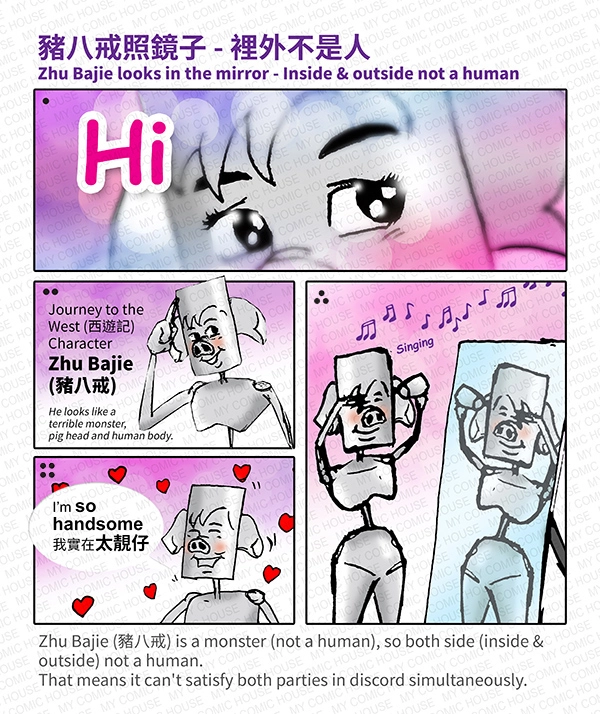
Zhu Bajie (豬八戒) is a monster (not a human), so both side (inside & outside) not a human.
That means it can’t satisfy both parties in discord simultaneously.

Literally, it means when the husband fans his wife, she feels cool and comfortable. However, “wife (妻)” and “chilly (淒)” sound similar in Cantonese, hence the phrase “chilly (淒)” is used as a play on words, implying a sense of loneliness or desolation.
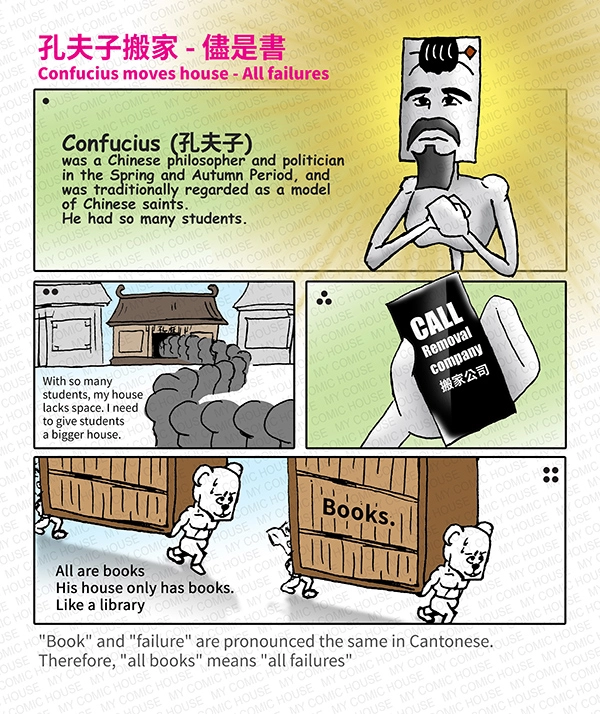 “Book” and “failure” are pronounced the same in Cantonese. Therefore, “all books” means “all failures”
“Book” and “failure” are pronounced the same in Cantonese. Therefore, “all books” means “all failures”
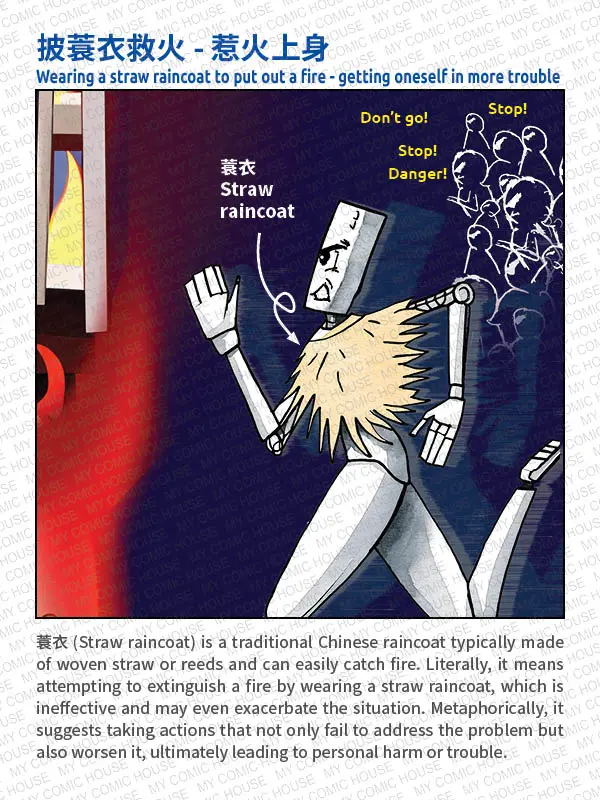
蓑衣 (Straw raincoat) is a traditional Chinese raincoat typically made of woven straw or reeds and can easily catch fire. Literally, it means attempting to extinguish a fire by wearing a straw raincoat, which is ineffective and may even exacerbate the situation. Metaphorically, it suggests taking actions that not only fail to address the problem but also worsen it, ultimately leading to personal harm or trouble.
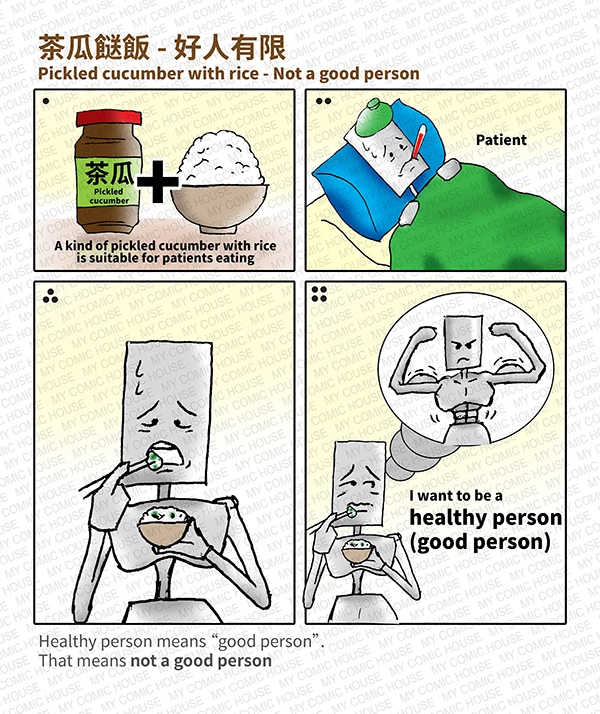
Healthy person Means “Good Person”
That Means not a Good Person.
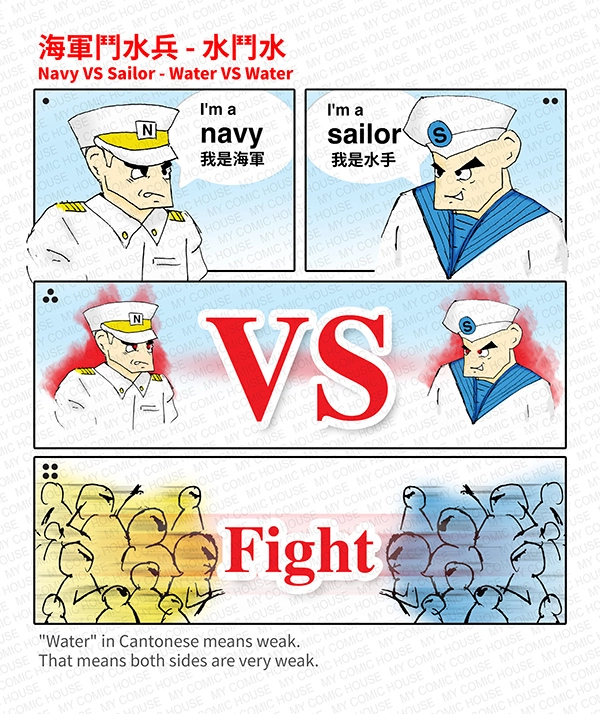
“Water” in Cantonese means weak.
That means both sides are very weak.

Loofah melon is easy to break, and it is not a good idea to beat dogs. Metaphorically. This means a certain loss.
Chinese Allegorical 歇後語
Chinese Allegorical 歇後語 (Cantonese), a two-part riddle-like saying. The first part throws out a curious story or question, and the second delivers a witty answer that’s often a pun. The unexpected twist and wordplay leave listeners tickled with surprise and laughter.
Something Effect
Effect Series comics, These graphic narratives explore concepts like the “catfish effect,” using relatable situations to impart real-life lessons. prompting readers to develop critical thinking skills as they connect the dots between cause and effect.
My Fate
Daily life itself is a comic strip waiting to be drawn. From funny situations we witness to relatable moments we experience ourselves, these snippets hold the power to bring a smile. Capturing them in a comic strip allows us to share the lightness and humor that can be found in even the most ordinary moments.







